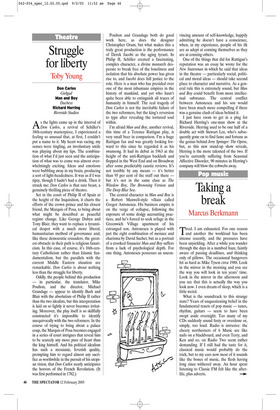Struggle for liberty
Toby Young
Don Carlos Gielgud Man and Boy Duchess Richard Herring Riverside Studios As the lights came up in the interval of Don Carlos, a revival of Schiller’s 18th-century masterpiece, I experienced a feeling so unusual that, at first, I couldn’t put a name to it. My heart was racing, my senses were tingling, an involuntary smile was playing about my lips. The combination of what I’d just seen and the anticipation of what was to come was almost overwhelmingly exciting. Ideas and emotions were bubbling away in my brain, producing a sort of light-headedness. It was as if I was tipsy, though I hadn’t had a drink. Then it struck me: Don Carlos is that rare beast, a genuinely thrilling piece of theatre.
Set in the court of Philip II of Spain at the height of the Inquisition, it charts the efforts of the crown prince and his closest friend, the Marquis of Posa, to bring about what might be described as peaceful regime change. Like George Dubya and Tony Blair, they want to replace a tyrannical despot with a much more liberal, humanitarian method of governance and, like these democratic crusaders, the greatest obstacle in their path is religious fanaticism. In this case, of course, it’s 16th-century Catholicism rather than Islamic fundamentalism, but the parallels with the current Middle Eastern situation are remarkable. Don Carlos is about nothing less than the struggle for liberty.
Oddly, the people behind this production — in particular, the translator, Mike Poulton, and the director, Michael Grandage — appear to identify Bush and Blair with the absolutism of Philip II rather than the two idealists, but this interpretation is laid on so lightly it never becomes irritating. Moreover, the play itself is so skillfully constructed it’s impossible to identify unequivocally with the two reformers. In the course of trying to bring about a palace coup, the Marquis of Posa becomes engaged in a series of court intrigues that reveal him to be scarcely any more pure of heart than the king himself. And his political idealism has such a messianic, feverish quality, prompting him to regard almost any sacrifice as worthwhile in the pursuit of his utopian vision, that Don Carlos neatly anticipates the horrors of the French Revolution. (It was first performed in 1782.) Poulton and Grandage both do good work here, as does the designer Christopher Oram, but what makes this a truly great production is the performance of Derek Jacobi as the aging tyrant. In Philip II, Schiller created a fascinating, complex character, a divine monarch desperate to break free of the loneliness and isolation that his absolute power has given rise to, and Jacobi does full justice to the role. Here is a man who has presided over one of the most inhumane empires in the history of mankind, and yet who hasn’t quite been able to extinguish all traces of humanity in himself. The real tragedy of Don Carlos is not the inevitable failure of the two reformers, but the king’s reversion to type after revealing the tortured soul within.
I’m afraid Man and Boy, another revival, this time of a Terence Rattigan play, is very small beer in comparison. I’m a huge Rattigan fan and was greatly looking forward to this since he regarded it as his swansong. It had its debut in 1963 at the height of the anti-Rattigan backlash and flopped in the West End and on Broadway after some predictably caustic reviews. It’s not terrible by any means — it’s better than 95 per cent of the stuff out there but it’s not in the same class as The Winslow Boy, The Browning Version and The Deep Blue Sea.
The central character in Man and Boy is a Robert Maxwell-style villain called Gregor Antonescu. His business empire is on the verge of collapse, following the exposure of some dodgy accounting practices, and he’s forced to seek refuge in the Greenwich Village apartment of his estranged son. Antonescu is played with just the right combination of menace and charisma by David Suchet, but as a portrait of a crooked financier Man and Boy suffers from a lack of psychological depth. For one thing, Antonescu possesses an uncon vincing amount of self-knowledge, happily admitting he doesn’t have a conscience, when, in my experience, people of his ilk are as adept at conning themselves as they are at conning others.
One of the things that did for Rattigan’s reputation was an essay he wrote for the New Statesman in which he said that ideas in the theatre — particularly social, political and moral ideas — should take second place to character and narrative. As a general rule this is extremely sound, but Man and Boy could benefit from more intellectual substance. The central conflict between Antonescu and his son would have been much more compelling if there was a genuine clash of ideas behind it.
I just have room to get in a plug for Richard Herring’s one-man show at the Riverside. Herring used to be one half of a double act with Stewart Lee, who’s subsequently gone on to find fame and fortune as the genius behind Jerry Springer: The Opera, but, as this new stand-up show reveals, Herring is the more talented of the two. If you’re currently suffering from Seasonal Affective Disorder, 90 minutes in Herring’s company will blow the cobwebs away.













































 Previous page
Previous page